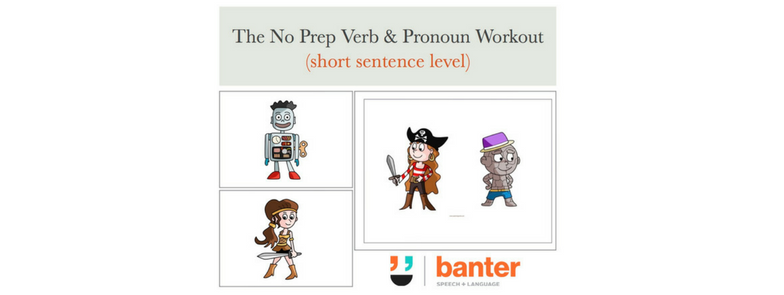Any regular reader of our articles will know that we love working on verbs – action words like “jump”, “kick”, “think”, “write” and “saw” – for clients with language learning impairments. You can read why here and here.
In addition to building vocabularies, verbs are key to making grammatically correct sentences. An increase in verb retrieval skills helps clients with word finding difficulties or limited vocabularies to improve their ability to make and say sentences (e.g., Edwards, Tucker, & McCann, 2004; Fink, Martin, Schwartz, Saffran, & Myers, 1992; Raymer et al., 2007; Raymer & Ellsworth, 2002; also, see Nickels, 2002). For example, studies on adults with aphasia reveal that an improvement in retrieval of trained verbs can result in improved sentence production with those verbs (Raymer & Ellsworth, 2002; Schneider & Thompson, 2003).
For clients – children and adults – with language learning impairments, it’s important to focus on the right verbs. You can read about key general “all purpose” and other verbs for late talking toddlers. For older children and adults, I focus on these as well as other high frequency verbs that clients are likely to use in the real world to communicate their thoughts and needs – verbs like “find”, “give”, “help”, “come”, “put”, “sit”, “fix”, “go”, “read” and “write”. Using the research on verb frequency, and principles of functional, basic English we’ve compiled a list of over 90 key verbs we focus on first.
Sentence level practice
Rather than just practising verbs on their own, we prefer to work on verbs at the sentence-level. This is because verbs prime (help clients to recall) not only who is doing the verb action, but also what they are doing it with and to what/whom (Ferretti et al., 2001; McRae et al., 2005). For example, if working on “cut”, the client will also be primed to recall who cut (e.g. “The boy”), what he cut it with (e.g. “scissors”) and what was cut (e.g. “the gift-wrapping paper”). Instead, of saying “cut” over and over again (and depending, of course, on the client’s language skills), we would therefore practice something like:
“The boy cut the gift-wrapping paper with the scissors.”
What a high repetition verb workout looks like
To introduce sentence-level verb practice, we’ve developed a verb “workout”. It includes:
- over 90 high-frequency verbs illustrated with high quality photos (rather than line drawings or – shudder – terrible clip art); and
- short sentence scaffolds to practice multiple verbs in present and past tense with a variety of different subjective pronouns (I/he/she/they).
Each verb card:
- features three forms of the verb: e.g. stop, stopping and stopped; and
- a marking (-, +, *) to indicate whether the past tense form of the verb is:
- – regular, unvoiced (e.g. “stopped”, “danced”);
- + regular, voiced (e.g. “carried, “played”); or
- * irregular (e.g. “got”, “did”, “made”, “threw”, “ate”, “took”, “held”, “sat”, “hit”) – particularly useful if the child or adult is overgeneralising.
The markings help us to sort the cards quickly in different ways to focus on specific targets.
We love using this resource in our clinic. Through our publishing arm, we are happy to share it with parents and families of children and adults who struggle to use verbs in sentences correctly here. We hope you find it as useful as we have.
Related articles:
- Late-talkers: kick-start language with these verbs
- “But he holded it and then he broked it and then he goed away!” Why do some children speak this way?
- Late talkers: how I choose which words to work on first
- Speaking for themselves: why I choose ambitious goals to help young children put words together
- How to help your school-age child learn new words – the nuts and bolts of how I actually do it in therapy
- “You know, um, veniculars-like, thingies you look through to see far away stuff. I don’t know!”: How to help school-aged kids to find their words
Principal source of information about verbs (and for more information about verb production therapy for people with aphasia): Edmondsa, L.A., & Babba, M. (2011). Effect of Verb Network Strengthening Treatment in Moderate-to-Severe Aphasia. American Journal of Speech-Language Pathology, 20, 131–145.

Hi there, I’m David Kinnane.
Principal Speech Pathologist, Banter Speech & Language
Our talented team of certified practising speech pathologists provide unhurried, personalised and evidence-based speech pathology care to children and adults in the Inner West of Sydney and beyond, both in our clinic and via telehealth.


Leave a Reply